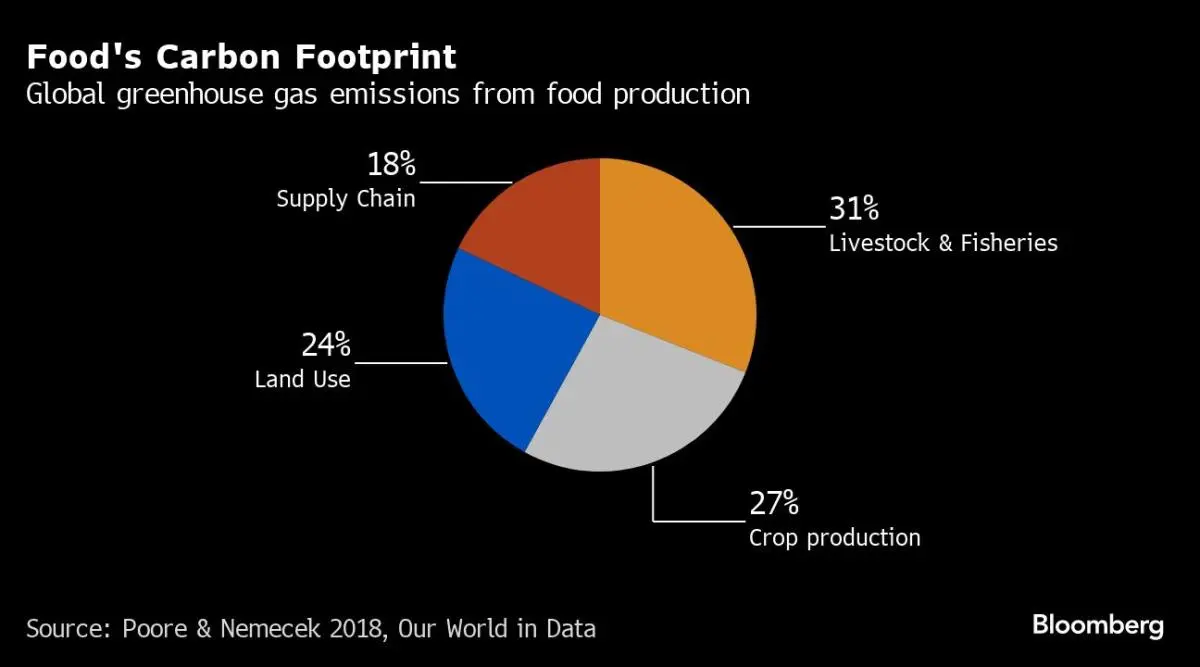Beef is the biggest mass consumed culprit. I think mutten might be worse, but it isn’t eaten nearly as much.
My point is, if you struggle to reduce meat consumption, just reducing beef consumption would make a big difference. Next time you are out, get a chicken sandwich instead of a burger. It’s that simple.
This is the actual reason I default to chicken and sometimes opt for fish. And oat milk. It’s not everything, but it’s a hell of a lot better than eating beef five nights a week and barely required any effort on my part.
Next time you are out, get a chicken sandwich instead of a burger. It’s that simple.
I wish it was that simple, but it isn’t. If consumers replace chicken with beef, chicken will get more expensive and beef will get less expensive. Maybe some factory farmers and slaughterhouses will change species and ranchers will hire a PR firm to start a “eat more beef” add campaign. A new equilibrium will be reached with no significant impact on animal welfare or the climate, because the meat industry is well aware that consumer preferences shift over time and is happy to accommodate those shifts as long as consumers keep eating meat.
What sends a message is vegetarianism or veganism. And, to a lesser extent, buying your meat from a local cooperative or raising your own. Taking money out of the pockets of the factory farm industry as a whole saves animals and sends a message. Just eating less beef doesn’t.
Ideally, more people would eat way less meat.
I stand by it being that simple. Beef production has more than 3 times the emissions per pound than other meats.
It isn’t about sending a message, it is about reducing GHG emissions.
As far as prices, maybe. I don’t know the ins and outs of raising animals for food. I don’t think meat prices are entirely supply and demand due to different costs in raising different animals.
your link is new to me, so i dug through it a bit, checked some references, and i’ve decided the methodology is bad, and the authors either know this or they should have known this. the primary source for the LCA comparisons says, in plain english, in the introduction that LCA’s should not be used for comparisons due to a lack of control for the data gathering procedures. the actual paper’s purpose was to, i shit you not, ignore this guidance, average every datapoint they could find for any food type, and then stock them together in one paper… to let you compare LCAs. this is shoddy work.
i didn’t bother to go digging into the tertiary sources on which your link relies, but i will say i did some of the reading into the sources for other papers on the impacts of animal agriculture, and i have yet to find any investigation that doesn’t attribute to livestock all of the impacts of everything in their diet. that seems reasonable: if a cow eats it, then it should be counted. but that falls apart under scrutiny. my primary example is that, in the united states, many cattle are fed cottonseed. cottonis not a food crop, though. it’s a textile. the cottonseed is a byproduct, and whether we feed it to cattle or press it for oil, any such use is actually reclaiming resources. how should that be counted? it’s not as though cottonseed is an essential part of cattle diets, it’s only through the happenstance of its availability and relative price point that it’s in there at all.
and this just points at a larger problem: everything in our agricultural sector is so intertwined and interdependent that the impact of anything is a mercurial notion, that changes on a seasonal basis dependent on the weather, technology, and people’s feelings.
i don’t believe beef can’t be raised sustainably (which is to say, indefinitely on a given plot of land, given sufficient sun and rainfall). i’m open to data about this, but cattle were among the first domesticated animals, and we’ve seen all kinds of climate change since then, so cattle can’t be the problem in-and-of themselves.
About half of the emissions from cattle are from methane; methane has about 80x the warming impact over 20 years that CO2 has.
Beyond that, cattle are slaughtered at 1 to 2 years old, while meat chickens are slaughtered at around 2 months. Cattle have worse feed conversion rates because they live longer.
feed conversion is often a meaningless metric for ruminants, which can graze for all of their necessary calories.
as I said above, it’s almost impossible to actually quantify the effects of any agricultural activity due to the interdependencies and variances in the industry. show me the source for you “half of the emissions” claim, and I’ll show you a flawed methodology and a counterexample to the claim.
The half of emissions that are methane are the cow burps themselves, because their stomachs ferment grass and produce methane as a waste product.
Even if you want to quibble about the accounting of the other half, without cows grazing there would be way, way less methane produced.
you’re just restating your case. I asked for a citation.
deleted by creator
I just misspelled it.
Also, falafels sandwich are amazing !
Just 12% of Americans - mostly men between age 50 and 65 - are responsible for half the beef consumption in America
Replacing beef with mutton?
Mmmm delicious porterhouse.
Plant based for the environment, vegan for the animals🖖
So many good reasons to eat less meat.
Eat…Rich…Eat the rich! Ok!
The good news is that the methane emissions are so damn bad that it also means that relatively modest reductions (in global percentage) will go a long way toward the problem.
Meat got expensive AF for me and my family. I’m actually surprised how easy it was to switch.
A lot of vegetarian alternatives are now catering towards former meat eaters, so the taste lines up better. And I also found a secret weapon. Asian mock meats is really really good.
Once in a while, I treat the family to those beyond meats, which taste pretty real. But they’re also expensive so…
deleted by creator
My recommendation is learn to love lentils. Replace the beef in your spag bol with them. So good and so much cheaper. Also beans, there are so many good things you can do with them.
Lentils r amazing, although they severely lack protein. Plus, they alone do not have all 9 required amino acids. To get them, u need to consume lentils AND beans.
The daily RDA for me is around 56 grams of protein. If I had to meet this demand via lentils and beans alone, then I would need to consume around 460 grams of lentils and beans DAILY. Yeah… Imagine the AMOUNT of gases after that lol.
HOWEVER, there still is a solution that I found. Say hello to “TVP”, ie., “Texturised Vegetable Protein”. This basically concentrates all this protein, while having all 9 required amino acids. To meet my RDA, I would need to consume just 120 grams.
I still do have lentils and beans sometimes. However, TVP is still always present in some form.
@UraniumBlazer @Nonameuser678 56 grams of protein from all sources. There is protein in almost everything you eat, and it combines to reach that goal. You don’t have to get all 56 grams from just lentils and beans
Also, it’s rice or some other grain you want to pair with lentils to achieve a complete protein, not beans – beans are legumes, and most legumes have a similar amino acid profile
Well wheat and rice have like under 4 gm of protein per 100gm. Vegetables are even less than this. I would have to eat kilos and kilos of stuff to meet my RDA this way.
Also, it’s rice or some other grain you want to pair with lentils to achieve a complete protein, not beans – beans are legumes, and most legumes have a similar amino acid profile
Oh yeah, I looked this up. I don’t see the beans lentil thing that I mentioned anywhere. So ig u’r right. I think I saw this in some YouTube video.
Well wheat and rice have like under 4 gm of protein per 100gm. Vegetables are even less than this. I would have to eat kilos and kilos of stuff to meet my RDA this way.
That is why I promote replacing beef, the biggest problem with anything else. It isn’t realistic to expect massive amounts of people to make such drastic changes to their diet in any reasonable time frame. We CAN drastically reduce GHG, especially methane from beef production by replacing it with a less harmful alternatives, and from there gradually scale back meat production as a whole.
Another issue is production. There needs to be time for food producers to change what they are producing. It takes time for plants to grow and animals to mature. If we all just ate rice and beans starting tomorrow, does the world even have enough to feed everyone? We can’t just eat a bunch of corn like cows do. We would have to get corn farmers to grow something else.
Considering the nutrition and production hurdles, I promote just reducing beef consumption right now. If that ever succeeds, I’ll move on to reducing meat consumption in general, giving time for viable alternatives to mature.
Suuuure… However, it’s not that difficult to replace all meat entirely, rapidly (around a decade). This is where TVP tech comes in, which I stated in my original comment.
TVP is tremendously cheap, contains as much protein as meat and is even easier to prepare than meat. It’s like vegan vibranium. Check it out.
Hows it taste?
Absolutely amazing when made properly. U need to soak it for like 15 min before cooking, then squeeze the brownish water out. Refill and squeeze immediately (u don’t need to soak for 15 min again ofc). The goal is to remove the brownish water (which contains the cardboard like flavor). Also, if you’re boiling it, remember to add salt to preserve the texture.
does the world even have enough to feed everyone?
Yes. If every human stopped eating beef and meat from sheep, we would need 50% of the agricultural area compared to now. And if everyone became vegan, we would only need about 25-30% of the area. There will never be a food shortage because of plants replacing meat in food.
we would need 50% of the agricultural area compared to now. And if everyone became vegan, we would only need about 25-30%
Yes, that is true. That isn’t what I am talking about.
I am talking about what is currently being produced right now. My gut tells me if everyone literally went vegan tomorrow, there wouldn’t be enough food to go around.
Reducing meat consumption does need to happen, but it will realistically take at least a few years, if not a decade to transition food supply chains. At minimum, it will take at least a few growing seasons to transition from animal feed crops to food crops.
Yes, it will definitely take years for such a transition. But since most people will not change their eating behaviour quickly and radically anyway, that will not be a problem I think.
Sure, 100 grams of raw spinach has only 2.9g of protein. But spinach cooks down a lot.
And remember, if you’re trying to get to 50g of protein a day, you add everything together. Was your breakfast a slice of toast and some berries? You might have eaten like 5g of protein there, and you haven’t even had an egg or anything that’s a real protein. If you add an egg, that’s 12g of protein at breakfast.
Ate a pb&j for lunch? That might have been another 10g of protein in that sandwich. Add a small side salad with some chickpeas and you’re easily at 15g of protein.
Then for dinner, a serving of lentils is like 13g. Suppose you ate that with some raita and spinach, and you’re easily at like 20g of protein at that meal already.
So that’s like 47g of protein. Eat a handful of nuts or two oranges and you’re at 50g of protein.
And imagine how many carbs you’re getting with your lentils. If you’re on a diet, getting your protein from lentils is pretty much impossible. Also, plant proteins are not as digestible as animal protein, so you need to add another 10-15% to your lentils to make up for that.
TVP is awesome. I pad out my meat with it. It’s a great way to cut down on your meat and really doesn’t distract from the meatiness at all. Beans and lentils have a texture, flavour, and mouth feel that is quite overwhelming and is really inescapable if you’re having any reasonable quantity of them.
This, I basically never buy any ‘vegan’ products. I just sub mince with red and yellow lentils and barley, it’s great and cheap. Add lots of veggies and you’ve got a delicious meal.
Vegan food companies selling healthy vegetables and staple foods: ✋
Vegan food companies selling fake meat: 👀🫴💸
living vegan has never been easier!
Some people unfortunately do not have access to good vegan options. That being said, people can reduce their consumption of red meat significantly and make an impact.
Don’t let perfect be the enemy of good.
vegan options? like produce, grains, and legumes? are you in a food desert yourself?
the “vegan options” you’re referring to are at the supermarket, and they are the cheapest items in there.I have plenty of friends who are vegans. I also have a few who tried it and failed because it’s not a switch you just turn off.
Giving the advice “just go vegan” is bad advice and counterproductive. There should be research into what it means and how to eat healthy vegan meals. You don’t just turn off the meat, which is what a lot of people assume they should do.
As a matter of fact I’d give the advice “go vegetarian, keep the milk eggs and fish, and if you like it and want to go further look into replacing those with some good vegan options.” It should be a process. Unless you start buying Soylent (the product not the movie), but that’s disgusting.
Consuming meat doesn’t automatically make you have a balanced and nutrituous diet. If you cared about that, you should inform yourself even if your not vegan.
Also “go vegetarian, keep the […] fish”, lmao.
I went vegan on a random Thursday a few years ago after learning about the ethical reality here, that harming animals for pleasure or convenience is unjustified.
It didn’t happen all in one day (the learning that is), but I didn’t do any meal planning. Didn’t even order vegan food before I decided to go vegan. Next time I went to the store I only bought vegan things. Since then anytime I have the ability to buy vegan goods, I do (which has been 100% of the time because I live in the west in the 21st century).
If you’re homeless in the middle of Palestine being bombed relentlessly by a genocidal state, yeah I’m not going to complain about you eating eggs that were given to you from a homeless shelter. If you’re rich enough to drive to the store and buy groceries yourself in the U.S or Europe, you have no excuse.
cost, convenience, and culture are the three reasons im not actively vegan. i drink soylent and huel. i do (a lot of ) my own baking. i have lots of vegan friends.
but nothing quite hits the convenience/cost equilibrium like 2/$1 gas station hot dogs. 500 hot calories available 24 hours a day literally on my way anywhere to do anything.
and i’m a community organizer. part of that is meeting people where they are. if i refuse to eat what they’re eating, it sets me apart. so i can’t very well turn down culturally relevant foods like burgers or hotdogs or whatever is at the picnic.
these aren’t excuses. they’re reasons. to overcome them, you’ve got to beat gas station hotdogs on cost and convenience, and convince my region to go vegan. i’m not spending my time on that.
I understand the reasons why people aren’t vegan. I also understand the reason why slaughterhouse workers have far higher rates of violence (domestic and non-domestic). I understand why people do terrible things, people aren’t born evil. Even Nazis weren’t born with some disposition to be evil. It’s not like literally millions of Germans just had some natural predisposition to be unbelievably evil and that went away once they lost WW2.
These are learned behaviors. I understand the reasons. They’re still not an excuse. You’re failing to do what you need to do, and just because I understand why you’re failing doesn’t mean you’re not failing.
Maybe you don’t care, maybe you like animal abuse, maybe you know you’re doing something wrong and see yourself as a failure. No matter your own views, the mass torture/genocide is still happening, and you’re supporting it. Hopefully one day you grow enough as a person to stop.
This comment is straight up vegan propaganda.
If you want to make arguments, do it. But leave emotion at the curb.
This comment makes me want to eat MORE meat.
the mass torture/genocide is still happening,
animal agriculture is not torture or genocide
Oh no, I’m so sorry for your poor friends. It must have been so hard to not abuse animals. I understand, not abusing animals is hard. When I stopped beating my dog with a rolled up newspaper every day, I was so depressed. I’m sure your friends are going through the exact same thing as me now that they aren’t paying for companies to put animals in cages and kill them.
they aren’t paying for companies to put animals in cages and kill them.
no one does that.
If you don’t think meat comes from locking animals in cages and killing them, where the fuck do you think meat comes from?
i don’t pay companies to do that. no one does.
I am interested to see what the summit actually says. the thumbnail graphic is just poore-nemecek, and the methodology on that was very lax.
carbon tax wouldn’t fix this, meat tax?
If it covered methane emissions on the basis of CO2e, it could.
A carbon tax has been politically really tough to pass in the US though.
yeah, would never pass federally. there’s got to be a state where this type of thing could get a foothold.
if it were me, if start in a place with a high gasoline tax, eliminate it, and replace it with a carbon tax that costs less.
now there is precedence. a foot in the door
The highest gas tax in the US is California, at $0.51/gallon. That’s not high at all.

I found 78¢ in CA. CA is a top three fuel consumer, so a carbon tax there would impact lots of folks. once someone does it, others may follow
That’s what happens when you add in sales taxes, which are applied to everything. It’s not going to happen so long as it looks like a backdoor way to increase the tax over time.
so many reasons why it won’t happen:
- backdoor to increase rates
- hurts automotive industry
- hurts ff industry
- hurts poor people
- hurts agriculture
- hurts manufacturing
- hurts retail
- hurts small businesses
- hurts big businesses
- etc
ultimately, one cannot make an omelette without cracking eggs
You need to get it past the WSPA first, and they know what it is.
Have you met a rich person who can’t avoid taxes? No but seriously even if every steak cost them $1000 it would not deter them because of the current wealth concentration.
No, stop being billionaires, and give your money away
Yep. I can stop eating food entirely without it making a dent. But if fucking musk could stop flying to the corner store it might help out a bit
I’ll take things that are never going to happen for $500, Alex
Do you think it will never happen or that it’s gonna take a lot of time and education? There seems to be a trend that societal change that reaches 3,5% take over an manifest themselfs. (https://www.bbc.com/future/article/20190513-it-only-takes-35-of-people-to-change-the-world)
Already happening in some countries https://www.theguardian.com/environment/2023/oct/24/uk-meat-consumption-lowest-level-since-record-began-data-reveal
A reminder that oil companies invented “carbon footprint” to distract you while they continue to pollute. Form unions and solidarity networks to overcome harmful systems. Don’t argue over hamburgers.
Reminder that this doesn’t absolve you from your personal responsibilities. You do need to be making choices that move the world towards a better future.
Besides that the number one reason for land loss, the loss of biodiversity, nitrate pollution, and methane production is still the bio-industy. Let alone the ethical implications of killing billions of animals a month.
You can do both. No, you’re obliged to do both. Stop supporting bio-industy and fight for rights.
In my country, the standard argument against climate action is “well China isn’t going to stop polluting so why should we?” This stock argument ignores the following facts:
-
Our per capita emissions have always been worse than China’s
-
China is already beginning to outpace us in green technologies
-
Even if China were behind us, our positive actions would still save lives because climate collapse affects us by degrees
-
I have no idea why the fuck all these “patriots” are opposed to the idea of us being better than China. I’d love to be better than China, and I think our government is illegitimate. Why the fuck am I a bigger patriot than these losers?
Apparently, the mainstream animal-abusing left gets their whataboutisms from the same place as my racist uncle, because now it’s capitalism’s fault that people have no obligation to do good things ever.
So, if you think of yourself as a leftist but you eat meat and drive a car, I’d just like to remind you that you chose to pay a killer to kill for you, and you chose to worsen the flooding and draughts in poor countries, and no, a corporation did not put the money in your hand and force you to do this.
-
These companies pollute to satisfy a demand. If people stopped driving cars, TotalEnergy and Shell would sell less oil.
Where these companies are evil is when they try to influence people and politicians. For example jay walking is a crime because of them.
That said taxing the hell out of these polluting industries is a solution, as it will raise the oil price and force people to consume less.
It’s not only cars, there are power plants running on oil, nearly every “small” backup generator runs on diesel. Also logistics, trucks, trains and ships needs boatloads of diesel.
The person you’re replying to said that if people stopped driving cars, companies would sell less oil.
You seem to disagree, and your argument is that energy and shipping use oil.
Are you saying that a carfree world would consume exactly the same amount of oil, because it still has energy and shipping?
I had the wrong assumption that cars consumed nowhere as much oil as those things. Turns out I was dead wrong - https://afdc.energy.gov/data/10661
industry creates its own demand.
Out of curiosity, does anyone know what would result in a bigger reduction of greenhouse gasses, the banning of beef or reducing our birth rate?
There is a distinct racist history to how overpopulation is discussed. High-birth-rate countries tend to be low-emissions-per-capita countries, so overpopulation complaints are often effectively saying “nonwhites can’t have kids so that whites can keep burning fossil fuels” or “countries which caused the climate problem shouldn’t take in climate refugees.”
On top of this, as basic education reaches a larger chunk of the world, birth rates are dropping. We expect to achieve population stabilization this century as a result.
At the end of the day, it’s the greenhouse gas concentrations that actually raise the temperature. That means that we need to take steps to stop burning fossil fuels and end deforestation.
Very interesting. Exactly the type of information I was looking for, thanks for providing. I do wonder why the question was down voted. That doesn’t seem like a productive way to achieve the desired result if the desired result is to convince more people that giving up beef is the lowest hanging fruit on the path to fighting climate change.
If anyone who down voted me reads this, please tell me why you did so that I may better understand how to communicate effectively.
I think it got downvotes because the people pushing the question tend to be promoting the idea that we could have a wonderful pure environment if only we killed off all the brown people.
Sure. But then shouldn’t people be convincing those people of why that thinking is bad? See my other comment regarding building consensus:
That’s why I had a comment explaining why it’s bad. Downvotes serve to make it less visible
Oh yes, I wasn’t pointing a finger at you specifically. Rather, I thought your response was excellent! I’m more just pointing out the civility of our discourse so that other people can learn effective communication strategies, and better my own as well. Thank you for your reasonable responses.
If anyone who down voted me reads this, please tell me why you did so that I may better understand how to communicate effectively.
i like to reduce the visibility of malthusian ponderings.
Hmm… I understand the desire for reducing the spread of damaging theories, but there also seems to be an element of burying one’s head in the sand to that approach. Wouldn’t it be more productive to explain logically and dispassionately what the problems with the thought processes are rather than ignore the problem?
How does that approach build consensus to effect meaningful policy change?
Simply ignoring the person’s position doesn’t convince them to vote differently.
I don’t care for voting. I don’t care to debate.
Fair enough! That makes sense to me.












